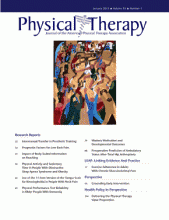Abstract
Background Mastery motivation is a precursor of future developmental outcomes. Evidence about whether toddlers with motor delay have lower mastery motivation is inconclusive.
Objective The purpose of this study was to examine differences between mental age–matched toddlers with and without motor delay on various mastery motivation indicators.
Design A mental age– and sex-matched case-control study was performed.
Methods Twenty-two children with motor delay, aged 23 to 47 months, and 22 children who were developing typically, aged 15 to 29 months, were recruited. Persistence and mastery pleasure were measured with behavioral tasks that were moderately challenging for each child and with maternal ratings using the Dimensions of Mastery Questionnaire (DMQ). The DMQ was rated by each child's mother based on her perception of her child's motivation. Two types of structured tasks (a puzzle and a cause-effect toy selected to be moderately challenging for each child) were administered in a laboratory setting and recorded on videos. Paired t tests or Wilcoxon signed rank tests were used to examine group differences in persistence and mastery pleasure (α=.007, 2-tailed).
Results Children with motor delay were rated lower on DMQ persistence than the typically developing group, but they did not show significantly lower persistence on the structured tasks. There were no significant differences in mastery pleasure between the 2 groups on either measure.
Limitations Large within-sample variability on the tasks and small sample size makes subgroup analysis (eg, different severities) difficult.
Conclusions Toddlers with motor delay did not show lower persistence and pleasure when given tasks that were moderately challenging; however, their mothers tended to view them as having lower motivation. Clinicians and parents should provide appropriately challenging tasks to increase children's success and motivation.
Footnotes
Ms Wang, Dr Hwang, and Ms Liao provided concept/idea/research design and data analysis. All authors provided writing. Ms Wang and Dr Hwang provided data collection. Ms Liao provided project management, fund procurement, study participants, facilities/equipment, and institutional liaisons. Dr Morgan and Ms Liao provided consultation (including review of manuscript before submission). The authors thank all of the participating children and their parents. They also thank the Pitotech Company for providing a trial version of the Mangold INTERACT software used for data analysis.
The study was approved by the Human Subjects Review Committee of National Taiwan University Hospital, Taipei, Taiwan.
This study was supported, in part, by Grant NSC 96-2314-B-002-074-MY3 awarded by the National Science Council, Taiwan (Republic of China).
- Received February 21, 2012.
- Accepted September 4, 2012.












